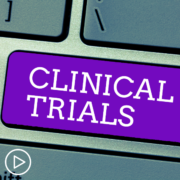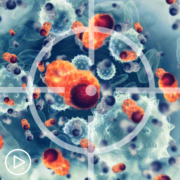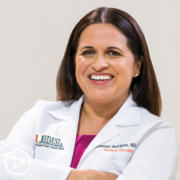Where Do Clinical Trials Fit Into a Lung Cancer Treatment Plan? from Patient Empowerment Network on Vimeo.
Clinical trial participation is essential to advancing cancer care options. Dr. Estelamari Rodriguez shares how clinical trials are providing lung cancer patients with more treatment approaches and discusses the safety protocols in place to protect patients.
Dr. Estelamari Rodriguez is Associate Director of Community Outreach – Thoracic Oncology at the Sylvester Comprehensive Cancer Center, University of Miami Health System. Learn more about Dr. Rodriguez, here.
See More From Lung Cancer Clinical Trials 201
Related Resources:
Transcript:
Katherine Banwell:
Dr. Rodriguez, research advances aren’t possible without patients participating in clinical trials.
So, where do clinical trials actually fit into a lung cancer treatment plan?
Dr. Estelamari Rodriguez:
So, clinical trials are really what move the science of all these developments that we saw at the oncology conference, the ASCO conference.
So, it’s not until patients join trials that we can approve drugs. So, I think clinical trials are very important, so we move the science. But then, for specific patients in lung cancer, now that we’re moving all of our best therapies upfront, we run out of options faster than we did for some patients. So, it is important that A) that we have access to clinical trials, which if we look across the country many of our cancer patients don’t have either Phase I programs near them, they’re very difficult to get to, or very expensive to get to.
So, we have to do a lot in terms of increasing access to clinical trials.
But I think your specific question has to do where it comes in. I think if you have advanced lung cancer, where most patients today will not have a cure, clinical trials is at the center of things that should be considered from the get-go. Sometimes some of the drugs are what is called Phase I, that these are new drugs that we’re trying to find a dose, we don’t really understand the efficacy of the drugs. So, those trials are reserved for patients that have failed standard treatment.
But then we have patients with very difficult situations that are progressing really fast that should join clinical trials. And I think that as we do more biomarker testing, we are learning a lot about the individual patient tumor.
So, the promise of precision medicine is that you can actually find drugs for specific patients, and that’s what clinical trials that are called basket trials, where if you have a mutation regardless of your tissue of origin. So, for example, we have two large basket trials that we are enrolling patients, one called the TAPUR trial and the other one called MATCH.
And MATCH is organized by the NCI and TAPUR by ASCO, and these trials if you find you have a biomarker analysis of next generation sequence, you find a specific mutation, you can actually see there’s a trial for this specific patient. So, the trials come in, I think they’re very critical to move the science, they’re very important for individual patients with rare mutations, but I think it’s upon us to make sure that these trials are available.
Katherine Banwell:
What advice do you have for patients who may be hesitant to participate in a clinical trial?
Dr. Estelamari Rodriguez:
So, I think you have to ask questions, I think that there’s a lot of misconceptions in different communities. So, we take care of a lot of Hispanic patients, and we have kind of really have to do a lot of education about what patients and patients family’s think about. Because sometimes I feel I have to convince the family members before I can get to really talk to the patient about the trials.
But I think in the past, trials have been considered only experimental, and patients are used for science but not really getting a benefit. So, I think that’s the first misconception. When we open a trial at our cancer center, and I’m part of the experimental therapeutics’ unit, we are opening trials that we believe that that science will move and offer something in addition. So, I think, that is not because we want to do an experiment, it’s because we really want to offer this patient the latest, or something new, that could potentially offer them a better response than what we are achieving with our standard treatments.
So, I think that’s the first misconception, that these are experiments on patients and patients don’t benefit. The whole point of the trial is to find better drugs and benefit.
So, it’s been shown in multiple parts of the country and big cancer centers that patients that join clinical trials do better at the stage of their disease. And part of the reason that they do better is that instead of having one doctor that is making decisions, and they’re running out of options, and kind of coming up with ideas out of nowhere, when you join a Phase I clinical trial or an organized trial, you have at least 10 to 20 doctors that are looking at your case or reviewing your images. There’s a lot of check to make sure that you’re not getting unwanted toxicity and that the trial is stopped if you’re not getting a benefit.
And this is important so that we don’t expose more patients to toxicity, but that’s another misconception that it’s not safe. And we’ll do our best to make sure that it’s safe.








